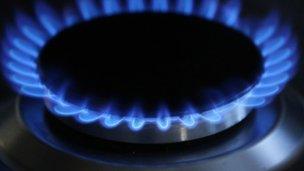Labour energy freeze plan 'could bankrupt investors'
- Published

Labour's plans to freeze fuel prices could bankrupt investors in energy companies, the head of the OECD has told Panorama.
Forcing firms to absorb wholesale price increases could put investors in financial danger, said Angel Gurria, the organisation's secretary-general.
Labour leader Ed Miliband has vowed to freeze energy bills for 20 months if his party wins the 2015 election.
Labour said the "big six" energy firms have been overcharging people.
Mr Gurria, head of the Organisation for Economic Co-operation and Development, said Labour's policy could damage business.
"If you freeze the price of energy, and the international price of energy rises, it means there's going to be a very big difference to pay.
"Who's going to be paying the difference? Are you going to ask the investors?
"They'll probably go bankrupt. How are you going to get people to come in and invest to get their money back in 30, 40 years' time when you say there's going to be a freeze?
"I think this is simply not consistent, not economically objective."
'Wild talk'
Shadow energy secretary Caroline Flint said the prices charged by the big six energy companies had been excessive.
"The price freeze is about recognising that the British public, whether it's domestic or in businesses, have been overcharged and that shouldn't be allowed to happen," she said.
"Wholesale prices dropped substantially in 2009. That was never reflected in a pass-on to the consumers and there's been a distortion ever since.
"Our policies, including the freeze, are about actually getting back to a place where we can have trust and confidence in this market."
Npower chief executive Paul Massara said the big six were being blamed unfairly for price increases.
"We've had lots of speculation and, quite frankly, wild talk without people looking at the facts.
"The facts are that we lost money in the retail business in 2009, 2010 and 2011, in 2012 we made about a 3.5% margin. That is hardly excessive.
"Unfortunately, the political dialogue right now means that with rising bills they want someone to blame and the suppliers are the easiest thing to shoot at."
Following Labour's announcement in September of a proposed freeze, four of the largest energy firms have announced substantial price rises, prompting calls for action from consumer groups.
Since then, the coalition has outlined proposals to reduce energy bills by an average of £50 a year in an effort to offset rising costs.
Chancellor George Osborne said the government would pay for some measures currently included in people's bills, and the cost of insulating homes would be spread over a longer period.
Energy Minister Michael Fallon told Panorama the policy was not designed as a response to Mr Miliband's announcement.
"The big six clearly have lost some trust over the last few weeks. They've all produced these rather similar price increases that people have thought were wholly unreasonable and were unreasonable.
"The government took action because we've not seen increases like this before of 8% or 9%. This had nothing to do with Mr Miliband."
Panorama: Power Failure?, BBC One, Monday 9 December at 20:30 GMT and then available in the UK on the BBC iPlayer.
- Published6 November 2013
- Published24 September 2013
- Published26 September 2013
- Published24 September 2013